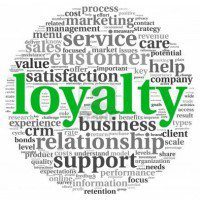We can, at last, affirm that Digital Marketing has gone mainstream for all FMCG companies – around the world. As companies continue to focus in on their digital marketing strategy and investments, the challenge remains integrating and blending the digital component with the traditional marketing activities. While it’s still considered somewhat of a foreign entity by many senior managers, digital marketing is given a specific emphasis; it is singled out. In short order, however, it will seem rather odd that people will be isolated as digital marketers, just like we don’t talk about TV or magazine marketers. It is, nonetheless, necessary to get some fundamentals right in order to create and layer in a successful digital marketing strategy.
Coming off a seminar I gave for Tencent in Shanghai, I defined what I believe are the four key principles that are needed to accompany a wining digital marketing strategy.
- Create Meaning & Find your Voice.
Especially in a social media enhanced world, where brands are conversing directly with customers, brands must clearly define their position and values. The brand values must be shared throughout the organization. When it comes to creating a social media editorial line, brands should strive to find a voice, develop a point of view and not be afraid to express an opinion. {Click to tweet please!} By doing so, a brand will be better able to create meaningful and engaging content.
- Engagement begins with the Employee.
In a hyper competitive world, where resources are inevitably limited and where digital media enables direct contact between the brand and customers, the most valuable asset is the employee. Brands need to pay particular attention to sharing and spreading the brand values, making employees feel an integral part of the brand and becoming its number one fans. {Click to Tweet}
- Focus on de facto Customer Centricity.
Digital marketing – and social media in particular – is enabling a 1-2-1 type of marketing. However, most brands tend to remain focused on their own messages and prerogatives, obscuring a brand’s ability to listen properly and engage with customers. Many companies are already talking about being customer centric – the term is almost banal. The challenge is making the statement come alive in the mind of the customer (and having the employee believe it, too). {Click to Tweet}
- Stress the importance of Loyalty.
As much as management will understand that word of mouth is the most powerful marketing tool, they will also be the first to ask how many new fans or likes there are on the social media platforms. Yet, the issue is not about acquisition because, as a newly acquired fan comes on board, the most important factor is keeping them. It is well documented that loyal customers are less expensive. They are the ones that will speak most convincingly about the brand/product. They are more likely willing to try new products. And, they can be useful allies for research & development or support in times of crises. However, it is not just about creating some loyalty programme that is typically a purchase reward scheme. {Click to Tweet}
In social media, granted there is a need for critical mass. But, it cannot be about the number of fans. There is a huge importance to focus on those customers who are most loyal and engaged. The question is: how many brand marketers are even aware of whom, among their swarms of followers, are the really important “fans” versus the chaff, i.e. those who, with little vim or conviction, once clicked nonchalantly on the LIKE button. This work is strategic and in itself may require a big shift in management’s mindset.
Do you see any other fundamentals in creating a winning digital marketing strategy?
Your feedback is not just encouraged. It is requested!













These are valuable insights indeed. There is no doubt about the power of digital marketing for FMCGs these days, but I find myself still advising my FMCG clients on some of the fundamentals of human communication. It seems those companies who have the power to reach so many with this media are still doing it in a way which alienates customers instead of embracing them.
To make my point, let me take you back to the days before the Internet, when the phone was the most immediate method for customers and companies to communicate. In those days, when you rang up your electricity company you would talk to someone directly. They would deal with your enquiry one-to-one and more often than not you would get off the phone thinking it was an effective use of time to have called them, and that – as a customer – you had been looked properly looked after.
These days many service companies, and others with large-scale customer numbers, try to improve efficiency by putting all that customer service online. The alternative they offer is to give answerphone service which, at best, keeps customers waiting too long and at worst, sends them round in circles and often back to the web site they came from in the first place.
I spend a lot of time explaining to my clients the importance of giving customers the feeling they're being handled one-to-one. Digital- and especially Email- Marketing gives us a unique way of doing this and yet companies still appear to be using it clumsily.
A very simple rule to use is that, when writing a broadcast to a newsletter list, for example, write it as if you're chatting to a single person (Minter Dial does this very well, don't you think?). Avoid phrases such as "We hope you all are…" and "Just thought we'd let everyone know" and "We are glad to have all your feedback". Those are the words of people who are on stage addressing an audience. There is nothing personal. There is no reason for customers to feel you're dealing with them individually. Instead, those phrases should say "We hope you are…" and "Just thought we'd let you know, [firstname]", and "We are glad to have your feedback". These are the kinds of phrases you use when you're talking to an individual, and not a crowd.
When done right, the customer feels that his or her needs are being looked after directly, whatever they are. In the old days we knew what they were because they were explained one-to-one over the phone. Nowadays, as we all move into the digital mass, companies have a social responsibility to maintain that level of service using the Internet and social media. Only then will it maintain a position of authority over its competitors and trust from its customers.
These are valuable insights indeed. There is no doubt about the power of digital marketing for FMCGs these days, but I find myself still advising my FMCG clients on some of the fundamentals of human communication. It seems those companies who have the power to reach so many with this media are still doing it in a way which alienates customers instead of embracing them.
To make my point, let me take you back to the days before the Internet, when the phone was the most immediate method for customers and companies to communicate. In those days, when you rang up your electricity company you would talk to someone directly. They would deal with your enquiry one-to-one and more often than not you would get off the phone thinking it was an effective use of time to have called them, and that – as a customer – you had been looked properly looked after.
These days many service companies, and others with large-scale customer numbers, try to improve efficiency by putting all that customer service online. The alternative they offer is to give answerphone service which, at best, keeps customers waiting too long and at worst, sends them round in circles and often back to the web site they came from in the first place.
I spend a lot of time explaining to my clients the importance of giving customers the feeling they're being handled one-to-one. Digital- and especially Email- Marketing gives us a unique way of doing this and yet companies still appear to be using it clumsily.
A very simple rule to use is that, when writing a broadcast to a newsletter list, for example, write it as if you're chatting to a single person (Minter Dial does this very well, don't you think?). Avoid phrases such as "We hope you all are…" and "Just thought we'd let everyone know" and "We are glad to have all your feedback". Those are the words of people who are on stage addressing an audience. There is nothing personal. There is no reason for customers to feel you're dealing with them individually. Instead, those phrases should say "We hope you are…" and "Just thought we'd let you know, [firstname]", and "We are glad to have your feedback". These are the kinds of phrases you use when you're talking to an individual, and not a crowd.
When done right, the customer feels that his or her needs are being looked after directly, whatever they are. In the old days we knew what they were because they were explained one-to-one over the phone. Nowadays, as we all move into the digital mass, companies have a social responsibility to maintain that level of service using the Internet and social media. Only then will it maintain a position of authority over its competitors and trust from its customers.
Strong, practical insights, Minter. Thanks for another great read!
To your point about digital marketing still being considered "somewhat of a foreign entity by many senior managers", shouldn't we refrain from still calling it something foreign? Isn't it simply marketing, in the digital age?
And that said, the traditional Marketing Mix should evolve, no? A shameless plug: http://martinhusar.com/2013/09/05/the-evolution-o…
Would luv your thoughts on this.
My recent post from P’s to C’s: the evolution of the marketing mix
Strong, practical insights, Minter. Thanks for another great read!
To your point about digital marketing still being considered "somewhat of a foreign entity by many senior managers", shouldn't we refrain from still calling it something foreign? Isn't it simply marketing, in the digital age?
And that said, the traditional Marketing Mix should evolve, no? A shameless plug: http://martinhusar.com/2013/09/05/the-evolution-o…
Would luv your thoughts on this.
My recent post from P’s to C’s: the evolution of the marketing mix